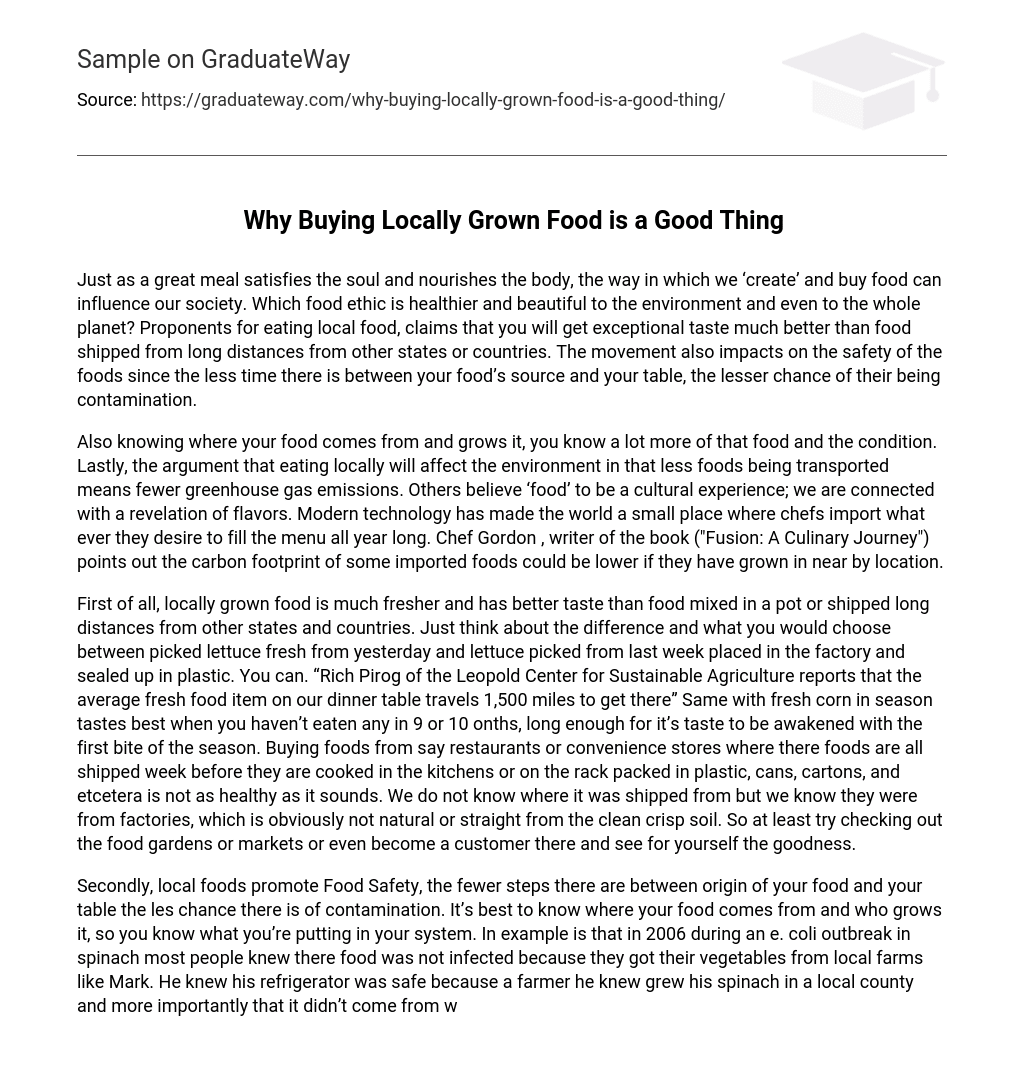Just as a great meal satisfies the soul and nourishes the body, the way in which we ‘create’ and buy food can influence our society. Which food ethic is healthier and beautiful to the environment and even to the whole planet? Proponents for eating local food, claims that you will get exceptional taste much better than food shipped from long distances from other states or countries. The movement also impacts on the safety of the foods since the less time there is between your food’s source and your table, the lesser chance of their being contamination.
Also knowing where your food comes from and grows it, you know a lot more of that food and the condition. Lastly, the argument that eating locally will affect the environment in that less foods being transported means fewer greenhouse gas emissions. Others believe ‘food’ to be a cultural experience; we are connected with a revelation of flavors. Modern technology has made the world a small place where chefs import what ever they desire to fill the menu all year long. Chef Gordon , writer of the book (“Fusion: A Culinary Journey”) points out the carbon footprint of some imported foods could be lower if they have grown in near by location.
First of all, locally grown food is much fresher and has better taste than food mixed in a pot or shipped long distances from other states and countries. Just think about the difference and what you would choose between picked lettuce fresh from yesterday and lettuce picked from last week placed in the factory and sealed up in plastic. You can. “Rich Pirog of the Leopold Center for Sustainable Agriculture reports that the average fresh food item on our dinner table travels 1,500 miles to get there” Same with fresh corn in season tastes best when you haven’t eaten any in 9 or 10 onths, long enough for it’s taste to be awakened with the first bite of the season. Buying foods from say restaurants or convenience stores where there foods are all shipped week before they are cooked in the kitchens or on the rack packed in plastic, cans, cartons, and etcetera is not as healthy as it sounds. We do not know where it was shipped from but we know they were from factories, which is obviously not natural or straight from the clean crisp soil. So at least try checking out the food gardens or markets or even become a customer there and see for yourself the goodness.
Secondly, local foods promote Food Safety, the fewer steps there are between origin of your food and your table the les chance there is of contamination. It’s best to know where your food comes from and who grows it, so you know what you’re putting in your system. In example is that in 2006 during an e. coli outbreak in spinach most people knew there food was not infected because they got their vegetables from local farms like Mark. He knew his refrigerator was safe because a farmer he knew grew his spinach in a local county and more importantly that it didn’t come from where the outbreak was “2006 Spinach E. coli Outbreak Revisted”).
Knowing how your fruits, vegetable, and crop is raised or grown helps you to choose safe food from farmers who avoid or reduce their use of chemicals, pesticides, hormones, anti-biotic or genetically-modified seed in their operations. In some rare cases food poisoning from restaurants have lead to death. We cannot always trust non-local foods from either factory or restaurant but you can with near-by food market, farms, or garden. Lastly, purchase these foods will have a strong impact on the environment by reducing reenhouse emissions (carbon dioxide) and materials such as copper, plastic, and Styrofoam used to park the ‘goods’. It also helps to make farming more profitable and selling farmland for development less attractive too (“Why Eating Local Food is Better”). Just think about what and how much our living would change if almost every citizen in Canada were to buy local foods. Every dollar you spend locally would help family farms in every community; they would continue to strive to excellence until it becomes worldwide.
Our environment would be so much cleaner and easier to breathe in because here would be a significant reduction of factories and greenhouse. If only it could be like that but we can take baby steps to getting more farms around ‘our’ community. “In the end and in all fairness, the world has a lot to offer, so buy your foods from farmers markets like Food Basics”. A better and more environmentally sound idea is making your own garden with planted fruits and vegetables or go to local gardens close to home. “Both ideologies can co-exist in harmony on the platter of culinary delights, complimenting each other and our community”. Going back to my reasoning on how buying local foods can benefit society reatly, first off for your health and taste buds, it’s more fresher and has greater taste than regular foods. Second on that was they are safer than long distant traveled foods. Speaking of long distant travel, buying local foods will reduce carbon dioxide emissions and packing material. If we the citizens of our community, our environment, economy, our world. We could make a positive impact to our selves and most importantly our planet earth. If you had a decision to make right now would you go the eco-friendly way and buy locally grown foods or stick to the ‘good’ stuff and spend loads of money on packaged foods, your call.





